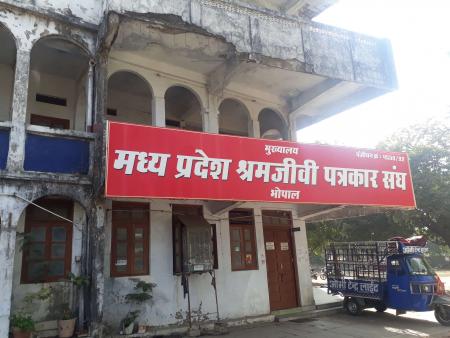
Photo of the front page of the last edition with the notice of closer
The newspaper did not mention the reason for shutting down the edition, and instead claimed that it was shifting to digital media.
But, there is more to the closure of DB Post than the management’s plea of just going ‘digital’, as the manner in which the decision was conveyed to the journalists was sudden.
Some of the affected journalists said that on their last working day, the management gave them three months advance ‘gross salary’ and an ‘experience certificate’ and asked them to leave.
According to sources, the company plans to shift three/four employees to its Hindi edition.
Sources in the management claimed that the owners wanted to shut the website by March 2019, and the Group’s claim of shifting to digital media was aimed at skirting any legal obligations. More so, the editor of the website www.dbpost.com, Shashank Shekhar, who had joined Bhaskar in January 2018, resigned from his post on Monday, sources said. So far, none from the journalists’ community or the unions have protested the treatment meted out over 35 journalists by a business house like Bhaskar. Even, the government-registered Madhya Pradesh Shramjeevi Patrakar Sanghis silent on the latest retrenchment of journalists.

Madhya Pradesh Shramjeevi Patrakar Sangh
This is not the first time, that the group has axed English journalists. It is said the Bhaskar group, known for its Hindi newspaper, has always been quite keen on bringing out an English newspaper. So far, the management has launched four English newspapers since 1986, but has failed to run any of those. Bhaskar launched its first English newspaper with the name Daily Bhaskar in 1986 (Bhopal), National Mail in 1995 (Bhopal), DNA in 2011 (Indore) and DB Post (Bhopal) in 2016, but all these were closed down after two or three years of publication.
Senior journalists and former employees of Bhaskar blame the management’s unprofessional approach with regard to English journalism, pressure for sensational news, fabrication and exaggeration of facts as some of the reasons behind the closure of its English newspapers.
Former DB Post journalist, Shams Ur Rehman Alavi, said most English journalists found themselves as “misfits” in adapting to the Groups’ culture. The feeling is that Bhaskar management treats them “unprofessionally”.
“Journalists are mistreated. The fear of losing jobs is always looming. They (management) prefers people who silently listen without raising any questions or giving any alternative perspective. Many journalists who have the experience of working in English newspapers, do not like this and hence, resign,” he said.
Reacting to the news of DB Post’s closure, in a Facebook post, Alavi flayed the Bhaskar management as also journalist unions for their “silence” over the issue.
“No one wants to pick up a fight against Bhaskar because they feel it may jeopardise their own job prospects in group’s Hindi daily in future, but, journalists have to speak against the unruly behaviour of the newspaper managements,” he added.
Another senior journalist, Rakesh Dixit, who had worked in two English dailies of Bhaskar, alleged that the Group had an “obsession” with running a national English daily. But, every time, the management has failed to do so, because of its “unprofessional behaviour and Hindi newspaper mindset”, he added.
“The management wants quick results like Hindi newspapers in a Hindi-dominated place like Bhopal and Indore. The management puts pressure on journalists to create sensational stories,” claimed Dixit, adding that “What Bhaskar has done with the journalists is unethical and unfair. Many of them are young journalists and it will adversely impact their career. The management hasn’t given any official notification before shutting the newspaper, but there is no institution to question them. It is like opening a new shop and shutting it the next day without informing the shop workers.”
Cases against Bhaskar Unconditional termination and transfer of journalists, unfair labour practices, wage disputes, long working hours, forced resignation have become common these days in the media industry. Very recently, hundreds journalists and workers from Press Trust of India were sacked but won the case in court. A similar case was seen in The Hindustan Times . The Bhaskar Group, too, has a history of following this trend.
From May 2016 to December 2018, a total of 365 cases have been filed by the journalists and other newspaper employees in the labour court under section 17 of Working Journalists and Other Newspaper Employees (Conditions Of service) And Miscellaneous Provisions Act, 1955 and Industrial Disputes Act 1948, according to data provided by the Madhya Pradesh Labour Department, a copy of which is with NewsClick. Of total 365 cases, 99 cases have been filed against Dainik Bhaskar for unfair termination or transfers and wage disputes, as per Majithia Wage Board. Out of this, in 13 cases, the Labour Court gave judgement in support of employees and issued Revenue Recovery Certificate (RRC) of Rs 11.30 crore to the Bhaskar Group, while rest of the cases are in pending. Besides, in 2015, the Madhya Pradesh Government filed nine criminal cases against the Group for non-compliance of Majithia Wage Board recommendations. However, all the cases are pending, as per a report filed by the Madhya Pradesh Labour Commissioner Shobit Jain in the Supreme Court on September 24, 2016, a copy of which is with NewsClick. NewsClick tried to contact with the Principal Secretary of the Madhya Pradesh Labour Department, Ashwani Rai, to know his views on the cases against Bhaskar Group and what action has been taken against them so far, but despite several attempts, there was no response.
The Tale of ‘Smart Newspaper’ DB Post Dainik Bhaskar officially launched DB Post in February 2016 with a tagline – the smart newspaper – and recruited senior journalists from Hindustan Times-Bhopal on high salaries. The newspaper also transferred some of its experienced journalists from the Hindi edition, and hiked their salaries. After the launch, the paper failed to draw readers’ attention and in between many senior journalists resigned, reportedly due to the “unruly” behaviour of the management and the Editor. Bhaskar then hired a senior journalist from Mail Today as the new Editor, with a high salary. With the entry of new editor and the paper’s “anti-establishment stand”, it picked up a pace and within a short span, its circulation rose to 30,000 in Bhopal, which is dominated by English newspapers, such as Times of India, Free Press Journal and The Hitavada. But the resignation of the senior journalists continued, primarily due the alleged “unprofessional work culture, which dented the newspaper’s image.
After initial success, the owner of the newspaper, late Ramesh Agarwal, urged the team to shift its focus on the website. Soon after, the management recruited some software engineers and social media experts to develop their website and increase their presence on digital platforms. Two-three months later, the management shut the digital department and let off all the employees of digital team.
By the end-2017, in short span of 19 months since its launch, more than 100 employees have either left DB Post or the management has reportedly forced them to leave, say sources. The newspaper’s circulation, too, has gone down to 8,000-10,000 from 30,000, sources added.
First published in Newsclick.
